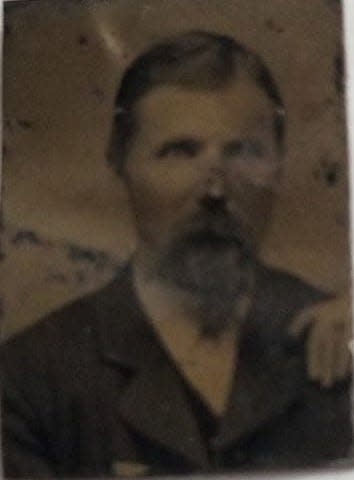Veterans column: Cook feted for defending President Garfield's honor
- Oops!Something went wrong.Please try again later.
Besides the money and gold watch from the Cincinnati Commercial newspaper, Captain Charles Cook gained more notoriety as word spread that he slapped George Morrison in July of 1881. An article in the Chicago Tribune on Sept. 20, 1881, carried a story from Caldwell, Ohio. Cook had been invited to come to the National Soldiers Reunion on Sept. 9 along with other political dignitaries.

The reporter wrote, “Before going over to the camp where the vast crowd was assembled, Capt. Cook told me that he was no speaker, and hoped that we would excuse him from anything like a speech. I replied that it was down on our bills that he would be there and at least show himself to ‘the boys’, who were all impatient to see him and hear the story of his encounter with Morrison from his own lips, and that they would be satisfied with nothing else. He reluctantly consented to go upon the speaker's stand and from his modest and embarrassed manner I am sure he would rather have marched with a storming column in a bayonet charge than to have mounted the stand. His modesty is charming and makes his appearance in public all the more attractive.
"The moment that the assembly caught sight of Capt. Cook as he made his way through the dense masses of human beings in the woods, off went every hat, and for fully five minutes the woods rang with cheers and applause. It was noticed just at this point that the prominent Democrats present all abruptly left their seats and walked rapidly out of the crowd.”
The crowd started chanting “Cook, Cook” as he went to the speaker stand. “Captain Cook stood before them, with a modest bow acknowledging the compliment paid him by his old comrades. In a quiet but rather musical voice, with his slouch hat in his hand, and without a gesture of any of the least show of the orator, Capt. Cook said; ‘I thank you for this honor. But I cannot accept it for myself. It is your way of showing your love for our stricken President. I am no speaker. I can make no speech. But your committee informs me that you want me to tell you why I slapped Morrison in the mouth. Well, I would rather say nothing about it but I must not disobey orders. There is only this to it. I heard that Morrison had expressed the wish that our President would die of the wounds inflicted by Guiteau. I went to him and hunted him up, and asked him if he had said so. He replied that he had, and said he hoped so. Then I hit him. He then drew a revolver and threatened to shoot me. I had no weapon but a knife and I took it out and opened it up and said, I have shot better men than you at $13 a month. If you don’t put up your revolver I will cut your rebel heart out. He then put up his revolver.”
Cook took a small bow when he finished among the cheers of the veterans and for the next hour was on the stage shaking hands. After that, he returned to Brownsville. Ten days after the reunion, President Garfield died of his wounds.
Cook lived in Brownsville until his death on June 18, 1926, at the age of 82. In his obituary, there is mention of his Civil War service but no mention of the Garfield incident. He was buried in the Cedar Hill Cemetery in Brownsville. A little over three years later, George Morrison passed away and was buried in the same cemetery as Cook.
Doug Stout is the Local History Coordinator for the Licking County Library. You may contact him at 740-349-5571 or dstout@lickingcountylibrary.org. His book "Never Forgotten: The Stories of Licking County Veterans" is available for purchase at the library or online at bookbaby.com & Amazon.com
This article originally appeared on Newark Advocate: Veterans column: Cook feted for defending President Garfield's honor
